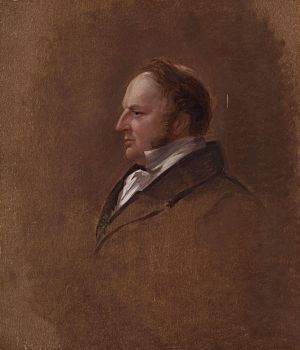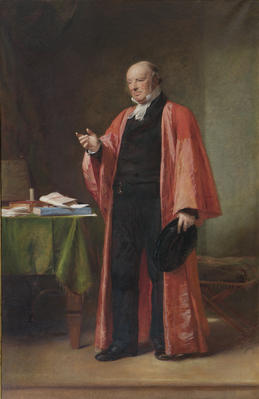Sir Robert Inglis, 2nd Baronet facts for kids
Quick facts for kids
Sir Robert Inglis
|
|
|---|---|

Sir Robert Inglis by George Hayter
|
|
| Member of Parliament for Oxford University | |
| In office 1829–1854 |
|
| Preceded by | Robert Peel |
| Succeeded by | Sir William Heathcote, Bt |
| Member of Parliament for Ripon | |
| In office 1828–1829 |
|
| Member of Parliament for Dundalk | |
| In office 1824–1826 |
|
| Personal details | |
| Born | 12 January 1786 Snelston, Derbyshire, Great Britain |
| Died | 5 May 1855 (aged 69) Belfast, Ireland, UK |
| Resting place | Ballylesson |
| Political party | Tory/Ultra-Tory |
| Education | Winchester College |
| Alma mater | Christ Church, Oxford |
Sir Robert Harry Inglis, 2nd Baronet (born 12 January 1786, died 5 May 1855) was an important English politician. He was a member of the Conservative Party. He was known for his very strong religious beliefs, which were part of the "high church" views within the Anglican Church. He was also a Fellow of the Royal Society (FRS), which means he was recognized for his contributions to science.
Contents
Sir Robert Inglis's Family Life
Robert Inglis was the son of Sir Hugh Inglis. His father was also a politician who served as a Member of Parliament (MP). Robert married Mary Briscoe.
Sir Robert Inglis's Political Journey
Robert Inglis took over his father's special title, called a baronetcy, in 1820. He became a Member of Parliament (MP) for several different areas.
Early Parliamentary Roles
- He was an MP for Dundalk from 1824 to 1826.
- He then represented Ripon from 1828 to 1829.
- In 1824, he was also given the role of High Sheriff of Bedfordshire, which was an important local position.
Representing Oxford University
From 1829 to 1854, Sir Robert Inglis was the MP for Oxford University. This was a very important role. He was known for his strong opinions, especially on religious matters.
Views on Religious Freedom
Inglis was very against ideas that he felt would weaken the Anglican Church. For example, he strongly opposed the Catholic Relief Bill in 1847. He believed it would make England less Protestant and allow Catholicism to grow too much.
In 1829, a leading politician named Robert Peel wanted to allow Catholics more rights. Inglis, with support from a group called the Ultra-Tories, ran against Peel for the Oxford University seat and won.
Opposition to Jewish Rights
In 1830, when there was a proposal to give Jewish people more rights, Inglis was strongly against it. He argued that Jewish people were not truly loyal to England. He also said that allowing Jewish people into Parliament would separate Christianity from the government. He even predicted that if Jewish people were allowed in Parliament, major changes like Parliamentary Reform would happen soon. While Jewish people didn't get full rights until 1858, Parliamentary Reform did happen just two years later, in 1832.
Views on Other Religions
Inglis also spoke about Buddhism in 1852. He called it "idolatry" during a discussion about the British colony of Ceylon (now Sri Lanka). This shows his strong religious views extended to other faiths too.
Disagreements with Robert Peel
In 1845, Inglis again disagreed with Robert Peel. He opposed the Maynooth Grant, which was a plan to give money to a Catholic seminary (a college for training priests) in Ireland. Other famous politicians like John Bright, William Gladstone, and Benjamin Disraeli also opposed it, but for different reasons.
Later Career and Legacy
In 1851, Inglis was offered a high position in the government, but he decided not to take it. A major part of his political work was leading a special committee that managed the House of Commons Library. He was a member of this committee for 14 years.
He was made a privy counsellor in 1854, which is a special advisory role to the monarch. Sir Robert Inglis passed away the next year, in 1855, at 69 years old. When he died, his baronetcy title ended because he had no children to pass it on to.
His personal journals are kept in the library and archives of Canterbury Cathedral.
Sir Robert Inglis's Character and Impact
Some people, like the politician Disraeli, did not think highly of Inglis's speaking style. Disraeli described him as a "wretched speaker" with an "offensive voice."
However, Inglis also showed great care and concern for the Irish people during the terrible Great Famine in the 1840s. He was well-informed about the suffering there. He even criticized landlords who didn't live on their land and neglected their tenants. Inglis was a dedicated public representative. He served as an MP for nearly 30 years and spoke 1,327 times in Parliament. This shows he was a very active and committed politician.
 | Audre Lorde |
 | John Berry Meachum |
 | Ferdinand Lee Barnett |


